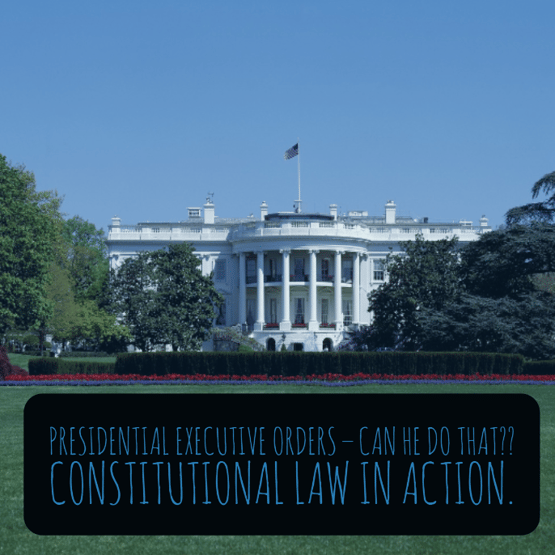Presidential Executive Orders – Can He Do That?? Constitutional Law In Action.

 This week in the Law School Insider we are bringing you Brendan Beery, Professor of Law at Cooley Law School. We talk to Professor Beery about the field of Constitutional Law, especially in relation to some of the actions of the new President of the United States.
This week in the Law School Insider we are bringing you Brendan Beery, Professor of Law at Cooley Law School. We talk to Professor Beery about the field of Constitutional Law, especially in relation to some of the actions of the new President of the United States.
Excutive power comes from Article 2. When the founders created Congress, they created a list of specific powers that Congress would have. There is no similar list of presidential powers; the Constitution simply gives the President "Executive power" and courts have been led to make decisions on what Executive means. Currently, the Courts have stated that the President is not able to make law but they can execute the law.
In regards to the most famous or most infamous order that President Trump has signed about a travel ban, some people say that the President has gone beyond the powers that have been given to him by Congress.
There are different "Zones" in which the President can be evaluated for the actions that they take. Congress can place the President in Zone One by approving of his actions or in Zone Three by disapproving.
If Congress is silent, the President is in Zone Two and courts will look at history to determine whether the President’s acts are constitutional. Courts usually allow presidents to sex foreign policy on his or her own, but not domestic policy.
Sometimes different statutes contradict each other, making it harder to know whether the President’s acts are legal.
In the end Congress cannot authorize the President to do something that violates some other part of the Constitution, like the First Amendment.
3 issues that have come into play in this specific case include:
- Establishment Clause
- Equal Protection Clause
- Due Process Clause
So far arguably these have been the undoing of the travel ban that had been eneacted by President Trump.
The field of Constitutional Law cries out for interpretation and instruction. There are many people in the media that say just apply the Constitution as written. Unfortunately, the Constitution uses words that are very broad and general and courts have to step in to define meaning behind the words that were written.
When you pick up the Constution for the first time it may be hard to read as there are words that are used that are antiquated and meanings that are not defined for you. If you want to delve a bit deeper into the Constitution, one way to start this is to read:
If you want to learn more about the executive order that was recently signed by President Trump regarding the travel ban, you can read more in a recent article written by Professor Brendan Beery.
Did you like this interview? Do you have a question for Brendan Beery? Leave a comment below to let me know!
If you liked this interview please consider leaving a ranking and review on iTunes, as this helps others to find us as well.
Are you a practicing lawyer? A law student? Would you like to be a guest on an upcoming episode of the Law School Insider or do you have a topic you would like to hear about? Send me an email at lawschoolinsider@cooley.edu


